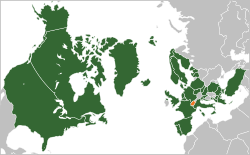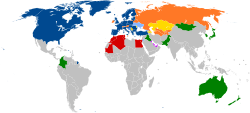Background
Historical neutrality
Neutrality is one of the main principles of Switzerland's foreign policy which dictates that Switzerland is not to be involved in armed or political conflicts between other states. [2] This policy is self-imposed and designed to ensure external security and promote peace. [3]
Switzerland has the oldest policy of military neutrality in the world; [4] it has not participated in a foreign war since its neutrality was established by the Treaty of Paris in 1815.
Although the European powers (Austria, France, the United Kingdom, Portugal, Prussia, Russia, Spain and Sweden) agreed at the Congress of Vienna in May 1815 that Switzerland should be neutral, final ratification was delayed until after Napoleon Bonaparte was defeated so that some coalition forces could invade France via Swiss territory. [5]
The country has a history of armed neutrality going back to the Reformation; it has not been in a state of war internationally since 1815 and did not join the United Nations until 2002. [6] It pursues an active foreign policy and is frequently involved in peace-building processes around the world. [7] [8]
According to Swiss president Ignazio Cassis in 2022 during a World Economic Forum speech, the laws of neutrality for Switzerland are based on The Hague agreement principles which include "no participation in wars; international cooperation but no membership in any military alliance; no provision of troops or weapons to warring parties and no granting of transition rights." [9]
Russian invasion of Ukraine
Switzerland follows defined rules to remain neutral in military conflicts, it imposed sanctions for this "serious violation of the most fundamental norms of international law [...] within the scope of its political room for manoeuvre." [10] Swiss law only allows for adoption of sanctions imposed by the United Nations Security Council, the EU or the OECD. [11] Irrespective of the actual laws governing a neutral country, many media outlets still labelled this as a break with 500 years of Swiss neutrality. [12] [13] [14]
In April 2022, the Federal Department of Economic Affairs vetoed Germany's request to re-export Swiss ammunition to Ukraine on the basis of Swiss neutrality. [15] The defence ministry of Switzerland, initiated a report in May 2022 analyzing various military options, including increased cooperation and joint military exercises with NATO. [16]
On 23 March 2023, Swiss Federal Councilor Viola Amherd made an official visit to NATO headquarters in Brussels to discuss the issue of re-exporting Swiss ammunition to Ukraine. This was the first visit of a Federal Councilor there, and while a diplomatic approach between the parties was successful, the Swiss side did not change its position in that regard. Jens Stoltenberg, Secretary General of NATO, said in an interview that he understood the standpoint of Swiss neutrality but could not comprehend why Switzerland would not allow the re-exporting of such arms for the defence of a nation. The Council of States would discuss the issue further in its 2023 June session. [17]
In May the Swiss Federal Council voted in favor to export 25 out-of-service Leopard 2 battle tanks to Germany to replenish their armament but still resisted the demand by NATO to actively re-export military equipment to Ukraine. [18]
In August 2023, the Russian hacker group Joker DPR released secret documents that several Swiss-made weapons systems were indeed to be delivered to the Ukrainian front. Among the possible shipments through Denmark and Baltic states, such as Latvia, are 22 Piranha-III armored vehicles manufactured by Mowag. This re-export was initially stopped by the Swiss government. The leaked documents show that such supply would happen through a middleman and trade with other goods despite ongoing measures by the Swiss to deny the re-export of military equipment to the conflict region. Business deals with 25 Swiss Leopard-2 combat tanks and Piranhas were also published by the Russian hacker group. The State Secretariat for Economic Affairs (SECO) was alarmed by these findings and attempted to safeguard the Swiss policy not to supply arms to the ongoing war. [19]
This page is based on this
Wikipedia article Text is available under the
CC BY-SA 4.0 license; additional terms may apply.
Images, videos and audio are available under their respective licenses.





